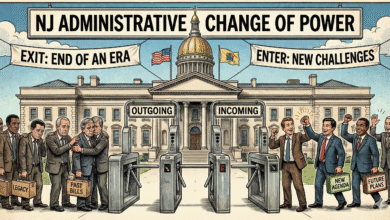The Baraka Gambit: Can a Unified Black Agenda Reshape New Jersey Politics?
In the packed pews of churches and community halls from Trenton to Long Branch, a new political force is taking shape in New Jersey. It’s a movement born not from a single campaign, but from a collective demand for systemic change. Spearheaded by Newark Mayor Ras Baraka, the Statewide Meetings for the Black Agenda are an ambitious effort to consolidate the political power of New Jersey’s more than one million Black residents into a unified, uncompromising force for equity. This is not just another series of political rallies; it is a calculated gambit to forge a policy-driven agenda that candidates and elected officials will have to answer to, whether they want to or not.
The movement’s strategy is a deliberate departure from traditional politics. Organizers have been explicit: their goal is to “hold elected officials and candidates accountable… not with endorsements, but with a commitment to the needs of our Black communities”. This represents a fundamental shift from loyalty to a party or person toward a model of issue-based power. By creating a clear, comprehensive platform, the Black Agenda aims to become a new center of gravity in New Jersey politics, forcing those who seek the support of Black voters to address the community’s priorities head-on.
The Seven Pillars of a New Foundation
The agenda itself is a sweeping indictment of the systemic inequities that persist across the Garden State. It is built on seven core pillars, each addressing a critical area where Black communities have been historically underserved and overlooked :
- Economic Justice and State Contracts: This demand confronts the staggering reality that Black-owned businesses receive “less than half of one percent” of New Jersey’s public contracts, placing them at the “absolute bottom” of all demographic groups.
- Black Maternal Health and Health Care Access: This pillar tackles a life-or-death crisis. In New Jersey, a Black mother is almost seven times more likely than a white mother to die from maternity-related complications, and a Black baby is over three times more likely to die before their first birthday.
- Housing Equity and Homeownership: This addresses a deepening divide. The homeownership rate for white households in New Jersey is 76.4%, nearly double the rate for Black households (39.7%). This gap is a primary driver of the state’s racial wealth gap, which has doubled since the pandemic to a staggering $640,000 between the median white and Black household.
- Education Equity: This calls for fair funding and culturally competent education, building on efforts like the state’s Amistad Legislation, which mandates the integration of African American history into school curricula.
- Civil Rights, Criminal Justice, and Police Accountability: This demand is rooted in the lived experiences of communities like Paterson, where “years of blatant police misconduct” led to an unprecedented state takeover of the local police department.
- Environmental Justice: This seeks to protect Black communities from the disproportionate harm of pollution and industrial contamination.
- Protection of the Black LGBTQIA+ Community: This ensures that the fight for civil rights is inclusive and protects the most vulnerable members of the community.
A Coalition of Generations and Institutions
To build this movement, leaders are grounding it in the historical structures of Black community power: the church and legacy civil rights organizations like the NAACP. The meetings themselves, held in sanctuaries and featuring addresses from faith leaders like Rev. Charles Boyer and national figures like Rev. Al Sharpton, are a testament to this strategy.
“A statewide Black Agenda is essential because it ensures that the specific needs, priorities, and voices of Black communities are recognized and addressed at every level of government,” said Jane Collins-Coding, chair and co-founder of the Black Empowerment Coalition. “Too often, Black communities have been underrepresented in policymaking and overlooked in the distribution of resources and opportunities”.
However, the movement faces internal challenges, particularly in bridging a generational divide. Some activists have pointed out the need for more effective outreach to younger New Jerseyans. Tinu Joseph, a youth community activist from Essex County, noted the low attendance of young people at the summits. “I don’t know if they are meeting people where they are,” she said of the organizers. “If you are not in the know or already affiliated with a church or institute, you’re not going to know about these events”. Joseph suggested tapping into sororities, fraternities, and even social events to connect with the “masses” of the next generation.
The Political Stakes
The timing of this movement is no coincidence. With a gubernatorial election on the horizon, the Black Agenda is being positioned as a litmus test for all candidates. Mayor Baraka, himself a gubernatorial hopeful, is one of the key organizers ensuring that the needs of the state’s Black residents are clearly defined before the November election.
The question now is whether this groundswell of activism can translate into tangible policy. The first summit in Trenton was criticized by some for ending without a clear, actionable agenda. The challenge for Baraka and other leaders is to harness the energy from these packed church halls and transform it into a political force that can dismantle the deep-seated inequities plaguing the state. The success of this gambit will determine whether New Jersey can truly build one state of opportunity, or if it will remain a state of two, deeply divided realities.
